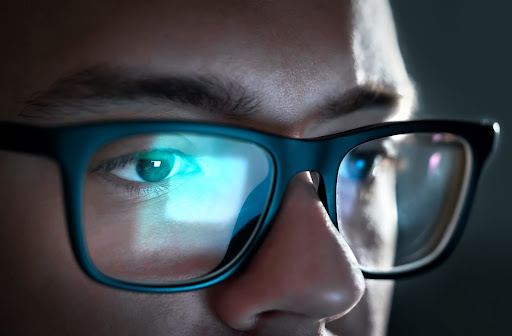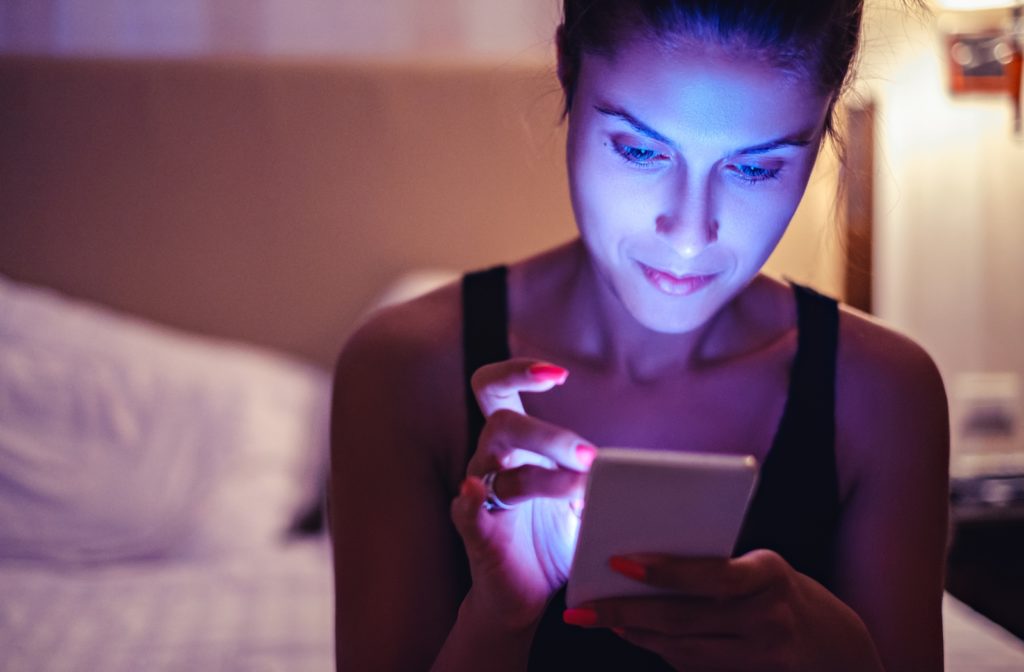Many people believe blue light can cause eye strain and other health concerns, such as age-related macular degeneration. With blue light being so present, should you be concerned about blue light exposure?
While blue light can affect you, it may not be in the ways you assume. Continue reading to learn more about blue light, how it can affect you, and if you should be concerned.
What is Blue Light?
Sunlight contains red, orange, yellow, blue, and indigo light, combining to create the white light we see. Blue light is a short wavelength, high-energy light which primarily comes from the sun, but it frequently emits from:
- Fluorescent light
- LED light
- Flat-screen LED televisions
- Computer monitors
- Smartphones
- Tablet screens
The blue light exposure you receive from digital screens is minimal compared to the amount emitting from the sun. Some worry about long-term blue light exposure because of many people’s proximity to screens and the extended periods spent using them. Despite this, blue light does have benefits for your health.
The Benefits of Blue Light Exposure
Good health requires blue light exposure from the sun. It helps to boost alertness, memory retention, cognitive function and can elevate your mood. Blue light helps regulate your circadian rhythm, the natural sleep cycle. Daytime exposure to blue light can help you maintain a healthy circadian rhythm.
Blue light can benefit your children too. Sunlight exposure is beneficial for children’s eyes, and studies have found a lack of blue light exposure may contribute to myopia development (nearsightedness). This light exposure may even be helpful as a preventative measure against myopia progression.
While blue light has its benefits, it can still affect aspects of your health. Is there any reason you should be concerned about blue light?

Should You Be Concerned About Blue Light Exposure?
Nearly all visible blue light passes through the cornea and the lens to reach the retina. If there is continued blue light exposure, there is a risk of damaged retinal cells, and some believe this cell damage may contribute to age-related macular degeneration.
Research has shown there is no definite link between blue light exposure and eye damage. While evidence says you do not need to be concerned about blue light, nighttime exposure may disrupt your circadian rhythm.
Some believe blue light exposure from digital screens can strain and damage your eyes. Let’s see how blue light can affect your eyes and overall health.
Blue Light & Eye Strain
While many worry about blue light causing digital eye strain, there is no evidence artificial blue light is harmful to the eye. Eye strain when using digital screens occurs because of how people use their devices. People typically blink less, use screens from poor distances, and focus for long periods without rest.
Eye strain does not cause lasting damage, but it can affect your quality of life. Eye strain can cause several irritating symptoms, such as headaches, blurred vision, dry eyes, and neck & shoulder pain.
The best treatment for eye strain is to rest your eyes by turning off your digital devices. You can protect your eyes from digital eye strain by:
- Sitting an arm’s length away (25 inches) from your computer screen
- Using the 20/20/20 rule; every 20 minutes, look at something at least 20 feet away for 20-seconds
- Using artificial tears when your eyes feel dry
- Adjusting your computer’s brightness & contrast to match the room’s lighting
- Investing in anti-glare coating or computer progressive eyeglasses
Blue light is not the cause of eye strain, but it can affect you in other ways. Some believe exposure to natural and artificial blue light can potentially contribute to age-related macular degeneration and affect your natural sleep cycle.
Blue Light & Age-Related Macular Degeneration
Some believe there may be a link between blue light and age-related macular degeneration (AMD). While studies conducted showed damage to cells from blue light, the study used cells in a dish and animals for testing. The experiments did not mimic the natural blue light exposure humans experience or use blue light from computer screens.
So far, research has shown no meaningful link between blue light and retinal damage or the development of AMD.
Blue Light & Sleep
Blue light emits from the sun and the digital devices you use throughout the day. This exposure helps to regulate our natural sleep cycle, but extended exposure at night may disrupt this cycle.
The blue light coming from your phone while you lay in bed slows the production of melatonin, known as the sleep hormone. You may be less alert in the morning and have difficulty falling asleep. If you have trouble sleeping at night, you can try the following for more restful sleep:
- Set your digital devices to dark or “night mode” to reduce screen brightness
- Avoid using screens 1 to 2 hours before sleeping
You do not need to worry about blue light exposure damaging your eyes, but you can lower your risk of eye strain and poor sleep by limiting screen time and forming good habits.
Protect Your Eye Health
By limiting screen time and developing healthy habits, you can protect your eyes from eye strain and get your body the rest it needs. Eye strain symptoms may not always relate to digital eye strain. If you’re still experiencing digital eye strain symptoms despite changing your computer habits, contact your optometrist.



